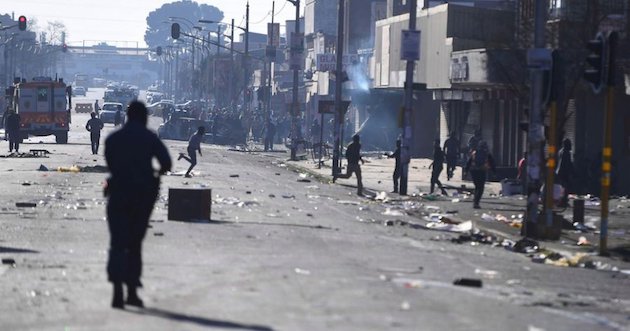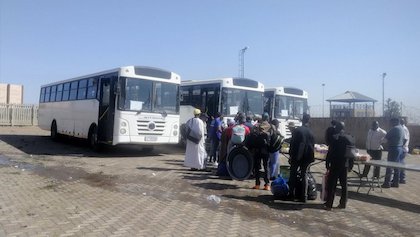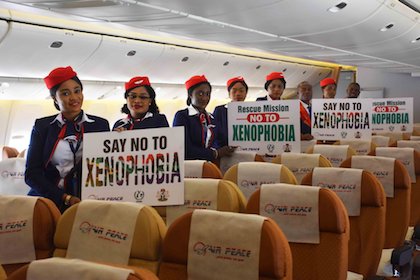At least 12 people have died and 600 have been arrested because of xenophobic attacks. “Churches have started to accompany innocent victims of this madness”, evangelicals say.
 At least 12 people have died during the conflict in South Africa. / Twitter @bieleckaag
At least 12 people have died during the conflict in South Africa. / Twitter @bieleckaag
The violent clashes that began in early September in South Africa, between natives and migrants (especially from Nigeria) have left 12 people dead and 600 arrested, according to local media Sowetan.
The President of Nigeria, Muhammadu Buhari, said on Twitter: “We will continue to put pressure on the South African government to take concrete and visible measures to stop violence against citizens of other African nations”.
Buhari's government initiated the evacuation of hundreds of its citizens based in South Africa. Around 300 people had already returned to their country and more than 600 have expressed their desire to do so.
On his side, South African President Cyril Ramaphosa said: “I condemn the violence that has been spreading around a number of our provinces in the strongest terms. The people of our country want to live in harmony. Whatever complaints or concerns we may have, we must handle them democratically. There can be no justification for any South African to attack people from other countries”.
XENOPHOBIA IS NOT NEW IN SOUTH AFRICA
South Africa, the main economic power in Africa, has already experienced other xenophobic events in its most recent history.
In 2008, about 60 people died and another 50,000 had to move because of the violence, and in 2015 seven deaths were recorded.
 Nigerian citizens ready to leave South Africa. / Twitter @UpdateAtNoon
Nigerian citizens ready to leave South Africa. / Twitter @UpdateAtNoon
ONE OF EACH TWO PEOPLE ARE POOR
The economic tension is one of the main causes of violence against foreigners. According to the South African Department of Statistics (STATSSA), 49.2% of the national adult population lives below the poverty line.
According to the Evangelical Alliance of South Africa (TEASA), the coexistence between natives and foreigners has worsened lately, especially in issues related to job insecurity and living conditions.
“Foreigners are not unionised, because many of them are illegal in the country and therefore are willing to take lower salaries and will readily tolerate unfair and illegal labour practices”, the General Secretary of TEASA, Moss Nthla, told Spanish news website Protestante Digital.
With an unemployment rate of 27% in 2018, five points more than ten years ago according to the World Bank database, the South African labor market is vulnerable and poorly protected.
“Business activities that used to be run by black small traders, now have to deal with foreigners with massive financial resources as competitors. Resentment becomes inevitable”, Nthla said.
“NOT ALL FOREIGNERS ARE CRIMINALS”
According to data from the South African Police, between April 2018 and March 2019, 617,210 direct contact crimes were recorded in the country, an increase of 2.6% over the previous year.
“Drug dealing, human trafficking and child prostitution do not come only from Nigerians”, the General Secretary of TEASA explained.
Nthla believes that the economic and criminal factors are key to understand the attacks in recent weeks against small businesses run by migrants.
“All foreigners are seen as a burden too heavy to bear by an already poor and financially squeezed black population, trying to recover from decades of Apartheid”, he said.
 The crew of Air Peace, the Nigerian airline with posters against xenophobia. / Twitter @flyairpeace
The crew of Air Peace, the Nigerian airline with posters against xenophobia. / Twitter @flyairpeaceThe inaction of the South African government has “aggravated” the situation, because “many people have felt like they are on their own, without policy protection against illegal trading in their neighborhoods. This has led many to turn to their own hands”, Nthla added.
In 2021, net international migration to South Africa is estimated to have reached over one million. In this context of increasing population diversity, it is mandatory to seek mechanisms for coexistence.
“CHURCHES TRY TO PLAY A MEDIATING ROLE”
That is why “evangelical churches have sought to play a mediating role around 3 main points”, Nthla explained.
First, “welcoming the stranger, for we were once strangers in foreign lands. Thankfully there is enough precedent in South Africa of peaceful coexistence with people of the neighboring countries of Lesotho, Botswana, Swaziland, Mozambique, who have been part of the backbone of the South African economy for generations”.
“Another way is challenging the authorities to clean up the policy frame work on migration as well as on criminal attitudes of some foreigners, which have fueled the xenophobia that sees all foreigners as unwelcome, although not all foreigners were criminals”.
Furthermore, “churches have also started to accompany innocent victims of the xenophobic madness, by giving shelter and support to those affected. There has also been an intercession across the country, calling the nation to the values of our Constitution”, Nthla concluded.
Meanwhile, hundreds of Nigerian citizens residing in South Africa are expected to leave the country in the coming days. A figure that could increase if violence does not stop.

Las opiniones vertidas por nuestros colaboradores se realizan a nivel personal, pudiendo coincidir o no con la postura de la dirección de Protestante Digital.
Si quieres comentar o